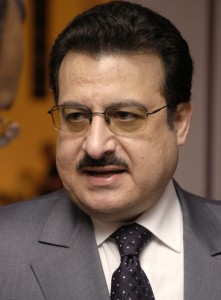December 27-2013

. . . envoy to UK
Some in the Arab world, especially Saudi Arabia, fear the new Big Six agreement with Iran means the United States and Iran are moving to become buddies and allies once again, and that America will then shove its long-time Arab allies into the abyss.
That, of course, would require that the Islamic Republic completely abandon its foreign policy, which has been geared for three decades to building up Iran’s authority in the Middle East by exploiting anti-Americanism.
Iran says its negotiations with Washington are limited to the nuclear issue and will cover nothing else. There are no official indications at this time that the Islamic Republic has any desire to bury the hatchet with Washington on any other issue.
But that hasn’t stopped the chatter in the Arab world. Until last week, the mutterings came mainly from journalists and retired officials and lacked official imprimatur. But last Tuesday, the Saudi ambassador to Great Britain, Mohammed bin Nawaf bin Abdulaziz al-Saud, aired the Arab fears—and conspiracy theories—for all the world to see in an op-ed article in The New York Times.
“We believe that many of the West’s policies on both Iran and Syria risk the stability and security of the Middle East. This is a dangerous gamble, about which we cannot remain silent, and will not stand idly by,” the ambassador wrote.
He complained that Washington was caving to both the Bashar Al-Assad regime in Syria and the Islamic Republic. What the world requires, he said in barely veiled language, was regime change in both Tehran and Damascus.
But Washington is ducking its responsibility and Saudi Arabia now has “no choice but to become more assertive.” He was vague about how Riyadh would do that, though he said “nothing is ruled out.”
Some did not believe the article’s overt declaration of independence from the United States, since Saudi Arabia has very limited abilities to act on its own. Some thought the article was more an effort to recruit Americans to pressure their government to confront Iran. They noted that the op-ed was written by the Saudi ambassador to Britain and not by Adel al-Jubair, the Saudi ambassador to Washington, allowing him more flexibility in dealing with US officials.
The ambassador to Britain wrote: “The Assad regime is bolstered by the presence of Iranian forces in Syria. These soldiers did not enter Syria to protect it from a hostile external occupation; they are there to support an evil regime that is hurting and harming the Syrian people. It is a familiar pattern for Iran, which has financed and trained militias in Iraq, Hezbollah terrorists in Lebanon and militants in Yemen and Bahrain.”
He complained, “Rather than challenging the Syrian and Iranian governments, some of our Western partners have refused to take much-needed action against them. The West has allowed one regime to survive and the other to continue its program for uranium enrichment, with all the consequent dangers of weaponization.”
Then he fired his telling salvo: “This year’s talks with Iran may dilute the West’s determination to deal with both governments. What price is ‘peace’ though, when it is made with such regimes?” In other words, Saudi Arabia does not want peace with Iran but prefers the United States go to war with it.
Some in Washington complained that the Saudis had failed to support Washington whole-heartedly in recent years when it was trying to mobilize global support against the Islamic Republic. One told the Iran Times, “The Saudis want to fight Iran to the last American, just as for decades they delighted in fighting Israel to the last Palestinian.”
The ambassador’s article went on, however, to say that Saudi Arabia was cutting the apron strings to the United States and would now take a more active role in confronting Iran and Syria. “The Kingdom of Saudi Arabia has no choice but to become more assertive in international affairs, more determined than ever to stand up for the genuine stability our region so desperately needs,” he wrote in ringing words.
Seeming to realize that many would laugh at such muscle-flexing, the ambassador insisted Saudi Arabia is up to the job. “We have global responsibilities — economic and political — as the world’s de facto central banker for energy. And we have a humanitarian responsibility to do what we can to end the suffering in Syria. We will act to fulfill these responsibilities, with or without the support of our Western partners. Nothing is ruled out in our pursuit of sustainable peace and stability in the Arab World.”
He closed with a nasty slam at the United States for abandoning Saudi Arabia in its time of need. “We expected to be standing shoulder-to-shoulder with our friends and partners who have previously talked so much about the importance of moral values in foreign policy. But this year, for all their talk of ‘red lines,’ when it counted, our partners have seemed all too ready to concede our safety and risk our region’s stability.”
President Obama had said the use of chemical weapons in Syria would be a “red line” for the United States.
One week after the op-ed was published, it has sparked surprisingly little reaction in the United States. A computer search by the Iran Times found only a solitary commentary addressing the ambassador’s points. Dan Murphy of the Christian Science Monitor rapped the ambassador’s effort to clothe opposition to Assad’s rule as a humanitarian need, noting out that the Syrian rebels are competing closely with Assad in a race to commit atrocities. Apart from that, the Iran Times could find no one taking up the op-ed article, either to endorse its points or to repudiate them.
